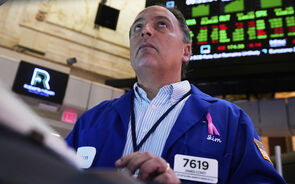Cramer: "Oil Wasn't Behind Tuesday's Surge"
9 mensagens
|Página 1 de 1
Quando um bloco grande está a ser vendido da forma que o Cramer disse em EMC, em vez de ser colocado todo ao mesmo tempo (como no exemplo dos 25mn acções), tem muito valor saber quando o bloco acaba.
A uns tipos que costumavam acertar muito nesses finais (dava trades fáceis), nós chamava-mos "os bruxos dos blocos". Acontecia bastante com o Santander ... ehehe.
A uns tipos que costumavam acertar muito nesses finais (dava trades fáceis), nós chamava-mos "os bruxos dos blocos". Acontecia bastante com o Santander ... ehehe.
- Mensagens: 3255
- Registado: 6/11/2002 19:27
Um dos primeiros artigos que li do Cramer, foi há uns 7 anos e era precisamente sobre isto. Ele defende que quando um fundo tem uma grande posição num papel, se o for vendendo ao longo dos dias no mercado normalmente, a pressão vendedora faz-se sentir tanto que acaba por vender a última parcela a preços muito baixos.
O que ele defende é que esse fundo deve tentar encontrar um comprador grande para a sua posição, dando um desconto forte em relação ao preço do mercado, fazendo aquilo que os americanos chamam de "blocks".
Ou seja... se uma acção está a 10 dólares e um fundo tem milhões de acções para vender, o que o Cramer defende é que o fundo deve procurar outro fundo que queira comprar essa posição, mesmo que seja a 9 dólares, ou seja, 10% abaixo do preço actual. É esse desconto que convencerá o comprador. Diz ele que muitos gestores de fundos não querem vender assim por terem que dar um desconto muito grande mas que, se ao longo de dias, forem vendendo normalmente no mercado acabarão por fazer um preço médio de venda inferior aos tais 9 dólares.
beijos,
Ulisses
O que ele defende é que esse fundo deve tentar encontrar um comprador grande para a sua posição, dando um desconto forte em relação ao preço do mercado, fazendo aquilo que os americanos chamam de "blocks".
Ou seja... se uma acção está a 10 dólares e um fundo tem milhões de acções para vender, o que o Cramer defende é que o fundo deve procurar outro fundo que queira comprar essa posição, mesmo que seja a 9 dólares, ou seja, 10% abaixo do preço actual. É esse desconto que convencerá o comprador. Diz ele que muitos gestores de fundos não querem vender assim por terem que dar um desconto muito grande mas que, se ao longo de dias, forem vendendo normalmente no mercado acabarão por fazer um preço médio de venda inferior aos tais 9 dólares.
beijos,
Ulisses
Cramer: "Oil Wasn't Behind Tuesday's Surge"
"Oil Wasn't Behind Tuesday's Surge"
By James J. Cramer
RealMoney Columnist
5/26/2004 10:24 AM EDT
"One of my favorite games to play is trying to guess the "simplistic" reason that will be given for rallies the day after we get one. Having wrestled with bottoms and rallies for most of my life, I know that they are rarely what they seem. I knew, for instance, that this morning, the press would finger a decline in oil as cause for the rise in stocks, even though there was no decline to speak of and, if anything, every day we spend with oil in this $40 area is a validation that $40 is with us for longer than the bulls expect.
Writers have a tough job. I know that every day, I am forced to come to terms with why the market may be doing something. And I know that the need for some shorthand explanation plays into the facile "oil was down" comments that don't explain jack.
In truth, having been behind the scenes at what causes rallies, it's usually something far more mundane and far less theoretical: A big hedge fund that had been short decided to go long; Fidelity had stayed away for a couple of days and came back in, buying down-and-out tech; some asset allocator decided to sell bonds and buy stock; some mutual fund got money in and stopped having to sell. Those are the real reasons declines stop. We want to put a news peg on them and we are willing to force that peg into any particular hole, but the idea that crude may have declined a nickel or a dime certainly can't explain the rally we had Tuesday.
Take EMC (EMC:NYSE - commentary - research). Here's a stock that does nothing but go down. Good news simply sends it down less than bad news. Tuesday it rallied. Did it rally because of crude? Hardly. Did it rally because of a new product introduction? It had one, but that one was a yawner. Did it rally because some analyst bulled it? Nope, almost all the analysts have given up on it because it goes down every day. I think it rallied because whoever has been selling it relentlessly day after day for the last four months either finished or went to the bathroom.
That's why I used to monitor the sell orders from brokerages so closely. The seller of EMC, whoever he is, has been pounding the stock daily. He has created a down stock. The stock cannot rally as long as he is selling it. There's no bit of news that transcends this ham-handed seller.
People have no idea, unless they've handled sell orders from the sell side or entered them on the buy side, how much endless pressure from endless -- and stupid -- sellers can wreck a stock. Most of the managers who run money don't know how to sell. They put some out every day, laying all over it, knocking it down, making it become a "down" stock.
What should they do? When EMC was at $12, the seller, who was selling then, should have gone into a major firm and asked, "What will you bid me for 25 million EMC?" The broker then would have checked the picture -- let's say it was $12.05-$12.07 25,000 up, and said, "11.75 bid for 25,000,000." The seller hits the bid, the broker distributes the discounted merchandise through the system, and EMC is done going down. But what has been happening instead is that every day, some clown sells 500,000 shares of EMC because he either didn't want to hit the discount $11.75 bid or doesn't know how to get one. Most people are so poorly trained on the buy side that they haven't got a clue that you can even do this stuff.
How ridiculous is it? Every once in a while, I go to a traders' conference somewhere and there will be a reader of my stuff who will say, "Yeah, I know, you had me pegged, I was the guy who walked down EMC. I didn't know how to trade." Or, I might get, "I wanted to blow it out into a discount bid but the portfolio manager said work it." Whatever. There's always an excuse for doing a crummy job.
In other words, you don't know when EMC is going to lift until you book the last sale on the piece. Of course, the people who run buy-side desks are so often both dumb and dishonest that they actually might go to another firm and reload and claim they're finished -- as if these sell-side desks didn't talk.
To me, in the last three days, a bunch of major sellers finished selling orders like the EMC one I told you about. There were plenty of short funds piggybacking off the sells. They scrambled to find stock. They know the drill: Once the stocks lift, we are out of sell mode and then, lo and behold, some scaredy-cat analyst actually comes out and upgrades EMC or some other stock that has been down every day and you get a chain reaction that puts you in buy mode.
I know that all of this stuff may seem foreign or obtuse. That's another reason it's easier to say that EMC rallied because oil fell. I could easily do that.
But you'd pay me nothing for that advice. Because that's what it is worth. "
(in www.realmoney.com)
(in www.realmoney.com)
By James J. Cramer
RealMoney Columnist
5/26/2004 10:24 AM EDT
"One of my favorite games to play is trying to guess the "simplistic" reason that will be given for rallies the day after we get one. Having wrestled with bottoms and rallies for most of my life, I know that they are rarely what they seem. I knew, for instance, that this morning, the press would finger a decline in oil as cause for the rise in stocks, even though there was no decline to speak of and, if anything, every day we spend with oil in this $40 area is a validation that $40 is with us for longer than the bulls expect.
Writers have a tough job. I know that every day, I am forced to come to terms with why the market may be doing something. And I know that the need for some shorthand explanation plays into the facile "oil was down" comments that don't explain jack.
In truth, having been behind the scenes at what causes rallies, it's usually something far more mundane and far less theoretical: A big hedge fund that had been short decided to go long; Fidelity had stayed away for a couple of days and came back in, buying down-and-out tech; some asset allocator decided to sell bonds and buy stock; some mutual fund got money in and stopped having to sell. Those are the real reasons declines stop. We want to put a news peg on them and we are willing to force that peg into any particular hole, but the idea that crude may have declined a nickel or a dime certainly can't explain the rally we had Tuesday.
Take EMC (EMC:NYSE - commentary - research). Here's a stock that does nothing but go down. Good news simply sends it down less than bad news. Tuesday it rallied. Did it rally because of crude? Hardly. Did it rally because of a new product introduction? It had one, but that one was a yawner. Did it rally because some analyst bulled it? Nope, almost all the analysts have given up on it because it goes down every day. I think it rallied because whoever has been selling it relentlessly day after day for the last four months either finished or went to the bathroom.
That's why I used to monitor the sell orders from brokerages so closely. The seller of EMC, whoever he is, has been pounding the stock daily. He has created a down stock. The stock cannot rally as long as he is selling it. There's no bit of news that transcends this ham-handed seller.
People have no idea, unless they've handled sell orders from the sell side or entered them on the buy side, how much endless pressure from endless -- and stupid -- sellers can wreck a stock. Most of the managers who run money don't know how to sell. They put some out every day, laying all over it, knocking it down, making it become a "down" stock.
What should they do? When EMC was at $12, the seller, who was selling then, should have gone into a major firm and asked, "What will you bid me for 25 million EMC?" The broker then would have checked the picture -- let's say it was $12.05-$12.07 25,000 up, and said, "11.75 bid for 25,000,000." The seller hits the bid, the broker distributes the discounted merchandise through the system, and EMC is done going down. But what has been happening instead is that every day, some clown sells 500,000 shares of EMC because he either didn't want to hit the discount $11.75 bid or doesn't know how to get one. Most people are so poorly trained on the buy side that they haven't got a clue that you can even do this stuff.
How ridiculous is it? Every once in a while, I go to a traders' conference somewhere and there will be a reader of my stuff who will say, "Yeah, I know, you had me pegged, I was the guy who walked down EMC. I didn't know how to trade." Or, I might get, "I wanted to blow it out into a discount bid but the portfolio manager said work it." Whatever. There's always an excuse for doing a crummy job.
In other words, you don't know when EMC is going to lift until you book the last sale on the piece. Of course, the people who run buy-side desks are so often both dumb and dishonest that they actually might go to another firm and reload and claim they're finished -- as if these sell-side desks didn't talk.
To me, in the last three days, a bunch of major sellers finished selling orders like the EMC one I told you about. There were plenty of short funds piggybacking off the sells. They scrambled to find stock. They know the drill: Once the stocks lift, we are out of sell mode and then, lo and behold, some scaredy-cat analyst actually comes out and upgrades EMC or some other stock that has been down every day and you get a chain reaction that puts you in buy mode.
I know that all of this stuff may seem foreign or obtuse. That's another reason it's easier to say that EMC rallied because oil fell. I could easily do that.
But you'd pay me nothing for that advice. Because that's what it is worth. "
(in www.realmoney.com)
(in www.realmoney.com)
9 mensagens
|Página 1 de 1




